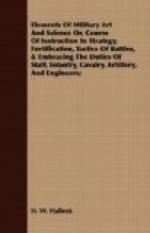Again, in 1805, the army of Mack was completely paralyzed, and the main body forced to surrender, at Ulm, without a single important battle. In 1806, the Prussians were essentially defeated even before the battle of Jena. The operations about Heilesberg, in 1807, the advance upon Madrid, in 1808, the manoeuvres about Ratisbon, in 1809, the operations of the French in 1814, and the first part of the campaign of 1815, against vastly superior numbers, are all familiar proofs of the truth of the maxim.
Strategy may therefore be regarded as the most important, though least understood, of all the branches of the military art.[4]
[Footnote 4: Strategy may be learned from didactic works or from general military histories. There are very few good elementary works on this branch of the military art. The general treatises of the Archduke Charles, and of General Wagner, in German, (the former has been translated into French,) are considered as the best. The discussions of Jomini on this subject in his great work on the military art, are exceedingly valuable; also the writings of Rocquancourt, Jacquinot de Presle, and Gay de Vernon. The last of these has been translated into English, but the translation is exceedingly inaccurate. The military histories of Lloyd, Templehoff, Jomini, the Archduke Charles, Grimoard, Gravert, Souchet, St. Cyr, Beauvais, Laverne, Stutterheim, Wagner, Kausler, Gourgaud and Montholon, Foy, Mathieu Dumas, Segur, Pelet, Koch, Clausewitz, and Thiers, may be read with great advantage. Napier’s History of the Peninsular War is the only English History that is of any value as a military work: it is a most excellent book. Alison’s great History of Europe is utterly worthless to the military man; the author is ignorant of the first principles of the military art, and nearly every page is filled with the grossest blunders.
We subjoin the titles of a few of the best works that treat of strategy, either directly or in connection with military history.
Principes de la Strategie, &c., par le Prince Charles, traduit de l’Allemand, 3 vols. in 8vo. This is a work of great merit. The technical terms, however, are very loosely employed.
Precis de l’Art de la Guerre, par le Baron Jomini. His chapter on strategy embodies the principles of this branch of the art.
Grundsaetze der Strategic, Von Wagner.
Cours Elementaire d’Art et d’Histoire Militaire, par Rocquancourt. This work contains much valuable information connected with the history of the art of war; but it is far too diffuse and ill-arranged for an elementary book.
Cours d’Art et d’Histoire Militaire, par Jacquinot de Presle. This work is especially designed for cavalry officers, and the other branches of military service are but very briefly discussed.
De Vernon’s Treatise on the Science of War and Fortification contains much valuable information; but, as an elementary book, it has the same objections as that of Rocquancourt.




